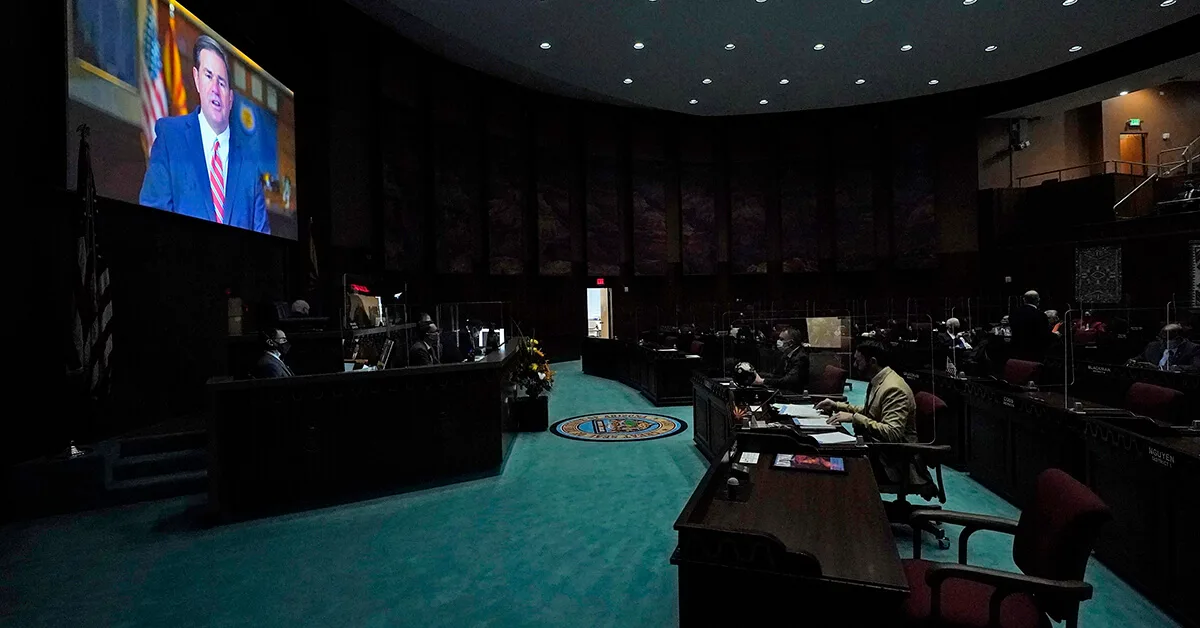
AP Photo/Ross D. Franklin, Pool
Superintendent of Public Instruction Kathy Hoffman said Ducey was ignoring the reality of COVID-19 and its effects on schools.
Schools that have lost students during the pandemic would see their funding cut under a proposal Gov. Doug Ducey outlined Monday in his annual state-of-the-state address, a speech that hardened his longstanding resistance to school and business closures.
The Republican governor warned schools that he expects them to offer in-person instruction as teachers gain access to the coronavirus vaccine.
“We will not be funding empty seats or allowing schools to remain in a perpetual state of closure,” Ducey said. “Children still need to learn, even in a pandemic.”
Ducey wants to fund public and charter schools based on their actual enrollment, not at pre-pandemic levels, said Getchen Conger, Ducey’s deputy chief of staff. That could open up big holes in the budgets for schools, which statewide have seen enrollment decline by about 4%, according to the Department of Education. Ducey’s comments were initially interpreted by many to mean he wanted to cut funding for remote learning.
The governor wants all children to have an option for in-person learning but he would not defund virtual education, Conger said.
Ducey has refused pressure from Superintendent of Public Instruction Kathy Hoffman, a Democrat, to pause in-person learning amid a rise in coronavirus infections that is crushing hospitals. But Monday’s speech was the most aggressive he has delivered in pushing for schools to fully reopen their doors.
Hoffman said Ducey was ignoring the reality of COVID-19 and its effects on schools, teachers, and students, saying schools had gone “above and beyond” to ensure learning continued during the pandemic. Ducey’s funding plans won’t sit well with them, she said.
“I think many educators will take that as a slap in the face, especially those who have been teaching from home since March under these very difficult circumstances,” she said.
In his seventh and shortest state-of-the-state address as governor, Ducey spoke directly to a camera from his office in the state Capitol.
The pandemic-era precaution came in place of the traditional pomp and circumstance of a speech that is normally delivered to a joint session of the Legislature, state Supreme Court justices, agency heads, and foreign consuls.
Ducey called for more money to help children falling behind because they have been away from their classrooms, a problem he said has affected particularly low-income students and children of color. Resources could include funding for summer school, longer school days, and one-on-one tutoring.
Ducey’s 22-minute speech focused almost entirely on the pandemic. He acknowledged pressure to take a tougher or lighter response. Public health officials and hospital leaders have pleaded in vain for Ducey to close bars and restaurants, impose a curfew or take other actions to limit interactions between people.
“If we’re really all in this together, then we have to appreciate that for many families ‘lockdown’ doesn’t spell inconvenience; it spells catastrophe,” Ducey said.
Meanwhile, some of Ducey’s fellow Republicans are pushing to end the public health emergency that has expanded the governor’s power to impose restrictions on businesses and individuals and opened access to federal funding.
A resolution to end the emergency with a majority vote in the Legislature, which would not require Ducey’s signature, could be among the first items that lawmakers address this year.
Ducey said he would fight that effort if only to prevent cities from imposing their own restrictions.
“I’m not going to hand over the keys to a small group of mayors who have expressed every intention of locking down their cities,” Ducey said.
Following early fears that the pandemic would cause an economic calamity and strain the state budget, Arizona’s finances have been relatively unscathed, with a nearly $1 billion rainy day fund intact and a large projected state budget surplus. Ducey called for tax cuts, a move minority Democrats and school-funding advocates are sure to fiercely oppose.
“I propose, in this session, we work together to reform and lower taxes and preserve Arizona’s good name as a responsible, competitive state,” Ducey said.
During his first campaign, Ducey pledged to cut taxes every year in office. Years of tax cuts starved schools of money coming out of the Great Recession, leading to teacher walkouts in 2018 and a promise from Ducey and lawmakers to increase teacher salaries.
Voters last year overwhelmingly approved an income tax hike on wealthy taxpayers to boost school funding, a measure that infuriated Ducey’s allies in the business community.
The Legislature’s Democrats lamented the call for tax cuts, saying the state needs the revenue to help those affected by the pandemic.
“We know that there’s an ineffective unemployment insurance program, we need to fix our housing assistance program and also expand child care subsidies,” said Rep. Reginald Bolding, the House minority leader. “The last thing we need to do is take dollars out of the general fund.”
The governor spoke shortly after newly elected lawmakers were sworn in and began the 2021 legislative session amid unprecedented security measures around the Capitol.
In the wake of mob violence by insurrectionist backers of President Donald Trump who broke into Congress last week in Washington and new threats of further violence at statehouses, the entire state Capitol complex is now ringed by a double-layer of fencing.
The general public was not allowed into the Senate or House or into the plaza between the two buildings and only a limited number of invited guests were on hand.
Rep. Rusty Bowers of Mesa was chosen for a second term as House speaker, overcoming a threat by several of his fellow Republicans to vote against him over anger that he refused to back Trump’s unfounded claims that he won Arizona’s electoral votes.
Republican Karen Fann of Prescott will serve a second term as Senate president.
Republicans hold a one-seat majority in both the House and Senate.
Politics

6 terrifying things that could happen if the Comstock Act is used to target abortion
Does 1873 sound like a really, really long time ago? Well, that’s because it is—but if Republicans and far-right anti-abortion activists have their...

He said what? 10 things to know about RFK Jr.
The Kennedy family has long been considered “Democratic royalty.” But Robert F. Kennedy, Jr.—son of Robert F. Kennedy, who was assassinated while...
Local News

Opinion: Strategies for Child Abuse Prevention
11 ways you can be an ally in the fight against child abuse. April is Child Abuse Prevention Month. In the United States, it is estimated that a...

Biden marks Earth Day by announcing $7 billion in solar grants
The Biden administration on Monday announced the recipients of its Solar For All Program, a $7 billion climate program that aims to lower energy...




